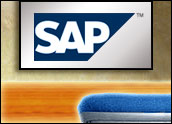
SAP, which has developed and acquired a number of applications for small and medium-sized companies, added yet another to its line up. SAP Business ByDesign is an on-demand enterprise suite aimed at companies with 100 to 500 employees that do not have strong internal IT support.
The application provides functionality in several areas, ranging from CRM, the supply chain and SAP’s core competency of ERP (enterprise resource planning) and financials. It is based on SAP’s Netweaver platform, which Bill Wohl, vice president of product communications, said was one of the product’s competitive differentiators.
“What we hear from companies is that they want to know that their IT investments will be safe for the long run,” he told CRM Buyer. “Netweaver will ensure that for them.”
The primary competitor to SAP Business ByDesign is NetSuite, which also provides a complete on-demand business suite for the mid-market.
However, SAP’s latest offering appears to be targeting a slightly different constituency, said Nucleus Research analyst Marc Songini. For instance, because the application is written on the NetWeaver platform, it would be a good choice for subsidiaries and partners of companies that use the enterprise SAP suite.
“There is a vast amount of room in this market. The question has always been how to access these people who rarely have one-on-one relationships with large vendors,” he told CMR Buyer.
The resellers, in this case, will be key. “SAP has a reputation for being best suited for large enterprises. The resellerhas to work to over come that,” he said.
Going Global
SAP is also differentiating itself from other providers by emphasizing its global ambitions with its introduction to the market. The application, which is being marketed at US$149 per month per user, will be introduced next year in Australia, India, Italy, the Netherlands, the Nordic region, South Africa, Spain, Canada and Mexico. SAP will roll out Business ByDesign in additional countries in 2009. The market demand for such an application is universal, Wohl said.
“We identified 60,000 companies in the United States and Germany alone that had yet to buy an integrated application,” he added.
Business ByDesign is live with several early adopter customers in the United States and Germany. Plans are under way to implement the application in select companies in China, France and the United Kingdom. Some 20 companies have gone live in Germany and the United States thus far, including Stemme, a utility and sports aircraft manufacturer; Judge Consulting Group, a provider of business technology consulting services; Mantz Airmotions, a manufacturer of air fresheners for homes and vehicles; and Compass Pharma Services.
Saving 25 Percent
These companies were typically looking for an integrated business suite in which it could move data from one business workflow to another without the usual hassles of integration or manual data input. Compass Pharma Services, for instance, which provides outsourced contract packaging, manufacturing and distribution services to pharmaceutical companies, was not able to share information among its functional departments. The firm said it implemented SAP Business ByDesign because it is a single, on-demand business application.
Compass Pharma Services now plans to spend less than 25 percent of its original IT budget because of the implementation, said company CEO Kevin Flanagan.Such a scenario sounds plausible but SAP will need to reveal more details about its application. For starters, the vendor has been somewhat vague about the features in the suite, Songini noted.
“SAP said it is designed from scratch for this market, which is good. And it has invested a lot in its development and marketing. We will know more when we see it in execution.”























































SAP may have two big problems with its Software as a Service (SaaS) offering. Nucleus Research analyst Marc Songini hits one of them with his quote to CRMbuyer: "SAP has a reputation for being best suited for large enterprises. The reseller has to work to over come that."
Another analyst, Patrick Fetterman, notes on his blog (patrickfetterman.com), "the mid-market is highly suspicious of these large vendors. The nightmare stories such as Ford Motor Company canceling their SAP implementation after spending hundreds of millions on the project scare the bejesus out of these companies."
The second issue is the model itself. Companies such as SalesForce (salesforce.com) and Plexus Online (plex.com) have achieved success by targeting the needs of specific business segments, such as manufacturers by Plexus. The SAP model looks like a "one size fits all" approach that might be good for the developer, but not necessarily the best solution for the customer.